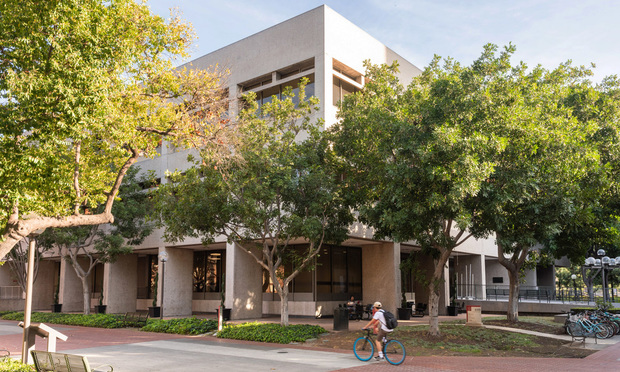Expulsion of USC Student Who Cheated to Get on Law Review OK'd by Court
The former law student argued that administrators should have placed more weight on her diagnoses of mental illness while considering her case, but a state appeals court disagreed.
March 27, 2019 at 02:02 PM
6 minute read
The original version of this story was published on The Recorder
 University of Southern California Gould School of Law. Photo: Chris Flynn
University of Southern California Gould School of Law. Photo: Chris Flynn
A California appeals court has upheld the University of Southern California's expulsion of a former law student who cheated in an attempt to get onto law review, then tried to pin the blame on a classmate once she was discovered.
Claudine Tinsman had argued that she was suffering from mental illness at the time of her transgressions, and that the university had not properly followed a lower court's directive to reconsider her case in light of that disclosure. But a three-judge panel of Division Seven of the Second Appellate District on Monday ruled that a subsequent university misconduct panel had appropriately weighed Tinsman's mental illness when it recommended for a second time that she should be expelled. Expulsion is the appropriate sanction for the severity of her offenses—which included criminal acts—even in light of her mental illness, that panel found.
“Ms. Tinsman's actions included: lying to a fellow student to obtain access to her computer, accessing the student's work, copying that work and misrepresenting it as her own, hacking into the student's email account, submitting a false admission on behalf of that student, repeatedly lying to university authorities during the course of the investigation, and causing harm to a fellow student,” according to the university panel report quoted in the appellate court's opinion.
In a statement Wednesday, the law school said it was pleased with the court's decision. “USC takes academic integrity issues very seriously,” the statement reads.
Tinsman's attorney, Mark Hathaway, said that any university “should be proud” to have Tinsman, who is now pursuing her doctoral studies, among their alumni.
“Mental illness is often met with societal prejudice and misunderstanding. This young woman was very fortunate for the intervention of her family and the critical care she received for an illness that almost killed her. She has made a long but remarkable recovery and has gone on to succeed in her graduate work. This case is a reminder that people overcoming mental illness still face harsh opinions.”
Tinsman is currently listed as doctoral researcher in cybersecurity at Oxford University.
Tinsman was a first-year law student at USC's Gould School of Law in 2014 when she participated in the two-week law review write-on competition, according to the opinion. Students were asked to prepare a legal memo and cite case law according to the Bluebook style, with top submissions landing students a spot on one of the school's three law journals. Students are not allowed to collaborate on the assignment.
Tinsman invited a classmate to stay at her apartment for several days, according to the decision. Following the competition, administrators noticed similarities between the submissions of both students and notified each that allegations had been made of their collaboration. Each denied the charge.
Less than a week later, an assistant dean at the law school received an email from Tinsman's classmate confessing to copying her work and passing it off as her own. When he responded to recommend disciplinary action, the classmate denied ever sending the confession and said she believed Tinsman had hacked into her email account. The classmate said Tinsman borrowed her computer on several occasions and that she had been contacted by the school's web portal asking if she had experienced problems logging onto her account.
Tinsman again denied the allegations of plagiarism and the hacking, and the law school referred the case to a university review panel. Tinsman was alleged to have violated 11 sections of the student conduct code, including falsifying documents and using a university computer to gain access to unauthorized information.
The review panel zeroed in on an apparently sarcastic citation from both law review submissions referencing the notoriously complicated Bluebook that read: “(making it hell on Earth to figure out how to cite to an annual report that is only available online, to resist throwing The Bluebook at the nearest passer-by, and to keep from calling up Columbia Law Review Association to demand 'Dunkin' Donuts' for my pain and suffering).”
The investigators asked the two students to explain the citation, and found Tinsman's explanation to be suspect. She told the investigators that she had been eating Dunkin' Donuts while working on the assignment. When investigators asked how she had obtained the donuts, given there are no Dunkin' Donuts in Los Angeles County, she told them a “friend from undergrad” brought them. She declined to provide contact information for the friend.
But two weeks later, the investigators received an email, purportedly from Tinman's undergraduate friend, saying he had mailed the donuts after canceling a planned trip to Los Angeles at the last minute, according to the opinion. They did not find that explanation credible, among other problems, and recommended Tinsman be expelled.
Tinsman appealed that decision within the university system, saying she had been diagnosed with bipolar disorder with psychotic features. But the appeals panel again concluded that she should be expelled, finding that her mental illness diagnoses came after her misconduct.
Tinsman then filed a petition for writ of administrative mandamus in state court asking for a stay allowing her to re-enroll in classes and an order that USC reconsider her expulsion in light of her mental illness diagnosis. The court in January 2017 ordered the university to reconsider Tinsman's case.
That third panel reached the same conclusion, however, finding that it “does not consider the physician's letter sufficient to overcome the preponderance of the evidence.” Tinsman then appealed in state court, arguing that the university had not followed the lower court's directive to take her mental illness into account.
The appeals panel disagreed, however, finding that USC did comply with the lower court's order. The order expresses skepticism about whether Tinsman's doctor understood the full scope of her misconduct, calling the doctor's letter “vague.” Tinsman's actions included, “hacking into [the classmate's] email account, writing a false confession from [her classmate], apparently inventing a fictitious friend to support her fabricated explanations (including creating a fake email account for this non-existent person), and maintaining calm and steadfast denials of misconduct to her law school dean and the [USC] review officer,” the opinion reads.
Read the opinion:
This content has been archived. It is available through our partners, LexisNexis® and Bloomberg Law.
To view this content, please continue to their sites.
Not a Lexis Subscriber?
Subscribe Now
Not a Bloomberg Law Subscriber?
Subscribe Now
NOT FOR REPRINT
© 2025 ALM Global, LLC, All Rights Reserved. Request academic re-use from www.copyright.com. All other uses, submit a request to [email protected]. For more information visit Asset & Logo Licensing.
You Might Like
View All
Librarian's Termination Violated First Amendment Protections, Lawsuit Claims
3 minute read
Divided State Supreme Court Clears the Way for Child Sexual Abuse Cases Against Church, Schools

Longtime Purdue GC Accused of Drunken Driving Hires Big-Name Defense Attorney
3 minute read
LSU General Counsel Quits Amid Fracas Over First Amendment Rights of Law Professor
7 minute readTrending Stories
- 1Data Breaches in UK Legal Sector Surge, According to ICO Data
- 2PayPal Faces New Round of Claims; This Time Alleging Its 'Honey' Browser Extension Cheated Consumers
- 3Fired NLRB Member Seeks Reinstatement, Challenges President's Removal Power
- 4NY Inspector General Announces Attorneys Hired to Lead Upstate Region and Gaming
- 5Carol-Lisa Phillips to Rise to Broward Chief Judge as Jack Tuter Weighs Next Move
Who Got The Work
J. Brugh Lower of Gibbons has entered an appearance for industrial equipment supplier Devco Corporation in a pending trademark infringement lawsuit. The suit, accusing the defendant of selling knock-off Graco products, was filed Dec. 18 in New Jersey District Court by Rivkin Radler on behalf of Graco Inc. and Graco Minnesota. The case, assigned to U.S. District Judge Zahid N. Quraishi, is 3:24-cv-11294, Graco Inc. et al v. Devco Corporation.
Who Got The Work
Rebecca Maller-Stein and Kent A. Yalowitz of Arnold & Porter Kaye Scholer have entered their appearances for Hanaco Venture Capital and its executives, Lior Prosor and David Frankel, in a pending securities lawsuit. The action, filed on Dec. 24 in New York Southern District Court by Zell, Aron & Co. on behalf of Goldeneye Advisors, accuses the defendants of negligently and fraudulently managing the plaintiff's $1 million investment. The case, assigned to U.S. District Judge Vernon S. Broderick, is 1:24-cv-09918, Goldeneye Advisors, LLC v. Hanaco Venture Capital, Ltd. et al.
Who Got The Work
Attorneys from A&O Shearman has stepped in as defense counsel for Toronto-Dominion Bank and other defendants in a pending securities class action. The suit, filed Dec. 11 in New York Southern District Court by Bleichmar Fonti & Auld, accuses the defendants of concealing the bank's 'pervasive' deficiencies in regards to its compliance with the Bank Secrecy Act and the quality of its anti-money laundering controls. The case, assigned to U.S. District Judge Arun Subramanian, is 1:24-cv-09445, Gonzalez v. The Toronto-Dominion Bank et al.
Who Got The Work
Crown Castle International, a Pennsylvania company providing shared communications infrastructure, has turned to Luke D. Wolf of Gordon Rees Scully Mansukhani to fend off a pending breach-of-contract lawsuit. The court action, filed Nov. 25 in Michigan Eastern District Court by Hooper Hathaway PC on behalf of The Town Residences LLC, accuses Crown Castle of failing to transfer approximately $30,000 in utility payments from T-Mobile in breach of a roof-top lease and assignment agreement. The case, assigned to U.S. District Judge Susan K. Declercq, is 2:24-cv-13131, The Town Residences LLC v. T-Mobile US, Inc. et al.
Who Got The Work
Wilfred P. Coronato and Daniel M. Schwartz of McCarter & English have stepped in as defense counsel to Electrolux Home Products Inc. in a pending product liability lawsuit. The court action, filed Nov. 26 in New York Eastern District Court by Poulos Lopiccolo PC and Nagel Rice LLP on behalf of David Stern, alleges that the defendant's refrigerators’ drawers and shelving repeatedly break and fall apart within months after purchase. The case, assigned to U.S. District Judge Joan M. Azrack, is 2:24-cv-08204, Stern v. Electrolux Home Products, Inc.
Featured Firms
Law Offices of Gary Martin Hays & Associates, P.C.
(470) 294-1674
Law Offices of Mark E. Salomone
(857) 444-6468
Smith & Hassler
(713) 739-1250








